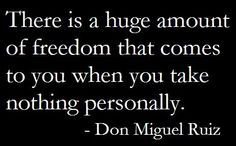
Happiness
Happiness With Others 2: Take Nothing Personal
How to never experience the unhappiness of hurt.
Posted December 29, 2013

A month ago, I returned home on a Friday evening, having spent the workweek consulting with an out-of-town company. As rewarding as was the work, the nights spent in my antiseptic motel room with the TV as my companion made me lonely for hearth and home.
Driving from North Carolina to Virginia, I fantasized about the celebratory evening that lay ahead. I envisioned my wife welcoming me as a conquering hero, serving me a luscious meal as if I were an honored guest, and lavishing me with nothing less than the adoration fit for a caliph.
I pulled in the driveway, walked into the house, and announced, “Honey, I'm home.”
Standing at the stove, her back to me, Patti glanced over her shoulder and said, “Hi, Dear. How was your trip?” With that, she kept stirring the contents of the pot in front of her.
I stopped dead in my tracks, shrugged my shoulders in disbelief, and slunk off to my easy chair in the family room. There I thought, Well, I guess I now know how much I really mean to her, lapsing into a pity-party fit for a king.
Before I could stew too long, Patti glided into the family room, plopped into my lap, and wrapped her arms around my neck. “Welcome home, Dear,” she said. “I was at a critical point in the special meal I'm preparing for you. Now I can greet you properly.” With that, I got the warmest and strongest hug of my life.
You could imagine what that did to my mood. In a flash I went from hurt to warmth, from heavy to lighthearted. And, guess what, we had the luscious, loving evening I dreamed about on the ride home.
The Lessons I Learned
I imagine that you, dear reader, can relate to the story I just shared. I bet that you, like me, could cite many times when you made false assumptions about the motives of your loved ones, friends, and colleagues, ones that led to unnecessary hurt and unhappiness. To help you not fall into the same trap I did, let me share three lessons I learned from my silliness on that Saturday evening.
1. Relationships can provide a motherlode of happiness. The fun, pleasure, and even joy that can be derived from relationships are virtually endless. To bring as much happiness as you can into your life, you would be wise to studiously mine your relationships for happiness.
2. As I said in my last blog, Happiness With Others 1: Premeditated Exceptions And Forgiveness — The Antidote To Hurt And Anger, we do not relate to saints and angels. Alas, we live with and among fallible human beings. These people, even though they may love you, will periodically act badly toward you, sometimes giving you what you don't want and other times not giving you what you do. Use your head; expect it and accept it as the inevitable byproduct of relationship life.
3. Whatever you do, take none of what those you relate with personal. Remember that nothing others do is because of you. It is because of them. Patti didn't tend to her cooking instead of rushing into my arms against me; she did so because she felt trapped by the circumstances she found herself in at the moment. Even if she had found herself out of love with me, she didn't not love me against me. She fell out of love with me because all the conditions inside her led her to not love me. Her not loving me would not be personal. It just was. While sad and sorrowful about it, I need not take it as an affront, intended to do me in.
What About You
Taking Nothing Personal is a hard lesson to learn. We are programmed to do so. If somebody calls you a name, say “stupid” or “superficial” or “thoughtless,” it's easy to think, “Of course it's personal, because he called ME that name.” But, his vilifying words as really about him; it's about how he sees the world, how he is constructed on the inside. Even if someone hauls off and strikes you, it is not personal, even at that extreme. It is about that person being who that person is at the moment.
Taking Nothing Personal also prevents you from suffering. When you really get that other people do what they do because of who they are, even when they act mean or nasty to you, you can never be hurt by what they say or do. You may feel sad, frustrated, or disappointed, but you will not suffer to the core.
To help you never take anything personal, take a few minutes and thoughtfully answer these three questions.
• Are you aware of when you feel offended and hurt? How does it feel? How do you act? Does it aid and abet your happiness to feel these painful emotions?
• Who are the people by whom you’ve felt hurt? Look at the incidents from your distant past, as well as the more recent ones, about which you carry hurt. What did these people do or not do that led you to respond with hurt?
• What did you tell yourself that led you to conclude that their behavior was about you? On that fateful Saturday with Patti, I thought, “If she really loved me, she'd have been so eager to see me she would have dropped everything and ran to my arms.” What did you tell yourself? Did you think it was personal? Is there a theme or a pattern to your thinking when you experience hurt?
Live It
Here’s my advice to you. Whatever people think, do, or say, do not — ever! — take it personal. To help you, you can practice the following five strategies.
1. Be Alert. Know when you find yourself taking something personal. Label this as an opportunity to practice depersonalizing what others do.
2. Practice. Our human mind can not only think about outside objects, events, and situations, but it can also listen to, think about, and talk to itself. So, when you think, “He did that to me,” you can say to yourself: “That's nonsense; he did that because that's the way he is; that's about him, not me.” By doing this ten times a day, 100 days in a row if necessary, you can habituate your mind to almost always take nothing personal.
3. Study Other People. Watch other people when they act in some inappropriate way. Ask yourself: “What is it about them that prompts them to act that way?” Remind yourself that other people rarely lay awake at night, peaceful and content, plotting to do you or anyone else in. Rather, when they act badly, it is usually a reactive response on their part to some distressing emotion they are feeling. In other words, it is about them.
4. Unconditionally Accept Yourself. This means that you detach your identity and your worth from anybody or anything. You, your self, are not what you do (good or bad) and not what you have (the approval or disapproval of others). You just are, yourself, with 100% humanity, validity, and worth, simply because you are alive and human. By accepting yourself unconditionally, you inoculate yourself from misery by making it hard to take the behavior of others personal.
5. Watch Yourself. When you act badly toward another person, analyze what prompted you to do so. You'll find it most always is because you simply weren't thinking clearly or were upset. Notice your behavior was more about your state of mind at the time, not a cold-blooded desire to do harm to the other person for your simple pleasure. Remind yourself that this is true of others as well.
Going Forward
A happy life almost always includes finding happiness with and among others. Taking their missteps personal can significantly limit, your happiness quotient. Taking absolutely nothing personal will allow you to enjoy them despite their occasional lapses of decorum. It will prevent you from carrying unnecessary hurt along with you as you move forward in life. It allows you to savor every possible ounce of pleasure from those with whom you relate.
Can you train yourself to take nothing personal? Of course you can. Will you? I hope so. But it depends on you working at it. Make the effort. Go for it. You are worth it.
Until the next blog, live healthy, happy, and with passion.
Russell Grieger, Ph.D. is the author of several self-help books, all designed to empower people to create a life they love to live. These include: Unrelenting Drive; Marriage On Purpose; and The Happiness Handbook (in preparation). You may contact Dr. Grieger for more information at grieger@cstone.net.



